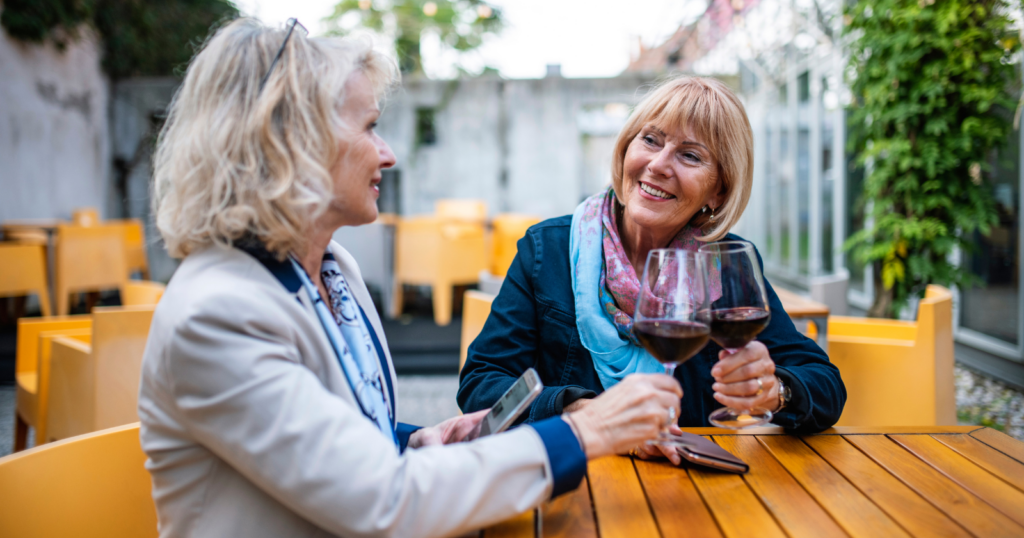I’ve always been fascinated by how we as humans evolve, not just physically, but also socially and psychologically as we age. We all know that time brings change.
But did you ever stop to consider how our social habits might morph as we close in on our 70s?
Well, psychology sure has some intriguing insights.
Contrary to popular belief, entering our 70s doesn’t mean becoming a social recluse. Quite the contrary, it can offer an entirely new perspective on social interactions.
In this article, we will unearth seven social habits that tend to shift when people hit their 70s, according to psychology. By doing so, we aim to shed light on this often underappreciated stage of life and the unique social dynamics it brings.
So, whether you’re approaching your 70s, know someone who is, or simply curious about what the future holds for your social life, this article is for you.
Let’s debunk some misconceptions and discover what truly happens to our social habits as we age.
Stay with me as we delve into this captivating topic.
1) Increased value on deeper connections
As we age, our social circles may shrink, but that doesn’t necessarily mean we become less social. Actually, it’s quite the opposite.
People in their 70s tend to place more value on deeper connections rather than expanding their social network. It’s about quality, not quantity.
In younger years, it’s common to focus on making as many friends as possible. But as we mature, we start to realize the importance of having a few close connections that truly matter.
This shift doesn’t mean we become anti-social or indifferent. Instead, it reflects a deeper understanding of what real connection and friendship mean.
So, whether you’re in your 70s or not, it’s never too early or too late to invest in meaningful relationships. After all, these are the bonds that truly enrich our lives.
2) Embracing solitude
Something I’ve noticed with my own parents, and some research seems to back this up, is that as people age, they start to value solitude more.
My mother, for instance, has always been a social butterfly. She loved to host parties, go out with friends, and was always the last one to leave any gathering.
But as she hit her 70s years ago, I noticed a distinct shift. She started spending more time alone, reading, gardening, or simply sitting on her porch watching birds.
It wasn’t that she lost interest in people or became lonely. On the contrary, she seemed more content and peaceful. She explained to me that she had started cherishing her alone time more. It allowed her to reflect, recharge, and truly enjoy her own company.
This doesn’t mean that people in their 70s become hermits. But they might find a certain tranquility in solitude that they didn’t appreciate before.
So, if you’re someone who fears being alone, just remember – solitude isn’t necessarily a bad thing. It can be a peaceful retreat and a time for self-discovery.
3) Less concern for social norms
When we’re younger, we often find ourselves tangled in the web of social norms, constantly worrying about fitting in and meeting societal expectations. But there’s something liberating that happens as we age.
I’ve watched my father, a man who always prided himself on being ‘proper’, start to care less and less about what others think as he journeyed into his 70s. For example, he decided to take up painting, something he’d always wanted to do but never did for fear of being judged.
This isn’t about becoming rebellious or careless. It’s about the realization that life is short and that it’s more fulfilling to live it authentically rather than according to others’ expectations.
So yes, you might see people in their 70s doing things they’ve never done before, trying new hobbies, or expressing themselves in ways that might seem out of character. But isn’t that what life is all about?
Living authentically, exploring new passions, and not being bound by the constraints of societal norms.
4) Prioritizing personal peace over conflict
Have you ever noticed how older people seem to avoid unnecessary conflicts? This is a habit that really seems to take root once we hit our 70s.
As we grow older, life’s experiences teach us that conflicts rarely lead to productive outcomes. This wisdom often leads to a shift in our social habits as we age. We become less inclined to engage in heated debates or pointless arguments.
Instead, maintaining personal peace becomes the priority. This doesn’t mean ignoring problems or issues, but rather approaching them in a more calm and collected manner, avoiding unnecessary stress and drama.
In essence, this shift is about recognizing that our energy is precious and choosing wisely where we want to spend it. It’s about understanding that tranquility and harmony contribute significantly to our overall well-being, particularly as we age.
5) The rise of altruism

As individuals step into their 70s, they often become more altruistic. This isn’t a random change, but one backed by science.
A study published in the journal Psychology and Aging found that older adults showed higher levels of compassion and were more likely to engage in volunteering activities than their younger counterparts.
This shift can be seen as an extension of the earlier point about quality connections. As we age, we tend to look beyond ourselves and our immediate circles. We seek to make a positive impact on the world around us, to leave some sort of legacy however big or small.
This heightened sense of altruism is not only beneficial for society but also for the individuals themselves. Volunteering and helping others can provide a sense of purpose and fulfillment, which contributes to overall well-being.
Next time you are considering your weekend plans or retirement activities, remember the joy that giving back can bring, not just to others but to you too. The 70s seem to be a perfect time to embrace this!
6) Greater empathy and understanding
In my experience, it seems that the older we get, the more empathetic we become. Life has a way of teaching us lessons that we can’t learn from books or classrooms. It’s these lessons, these experiences, that nurture a deep understanding of human nature and the complexities of life.
My aunt, aged 75, often astounds me with her empathy. She has the ability to truly understand people, even when she doesn’t agree with them.
It’s like she sees through their words to the heart of their emotions and experiences. She taught me that empathy is not about agreeing with someone, but about understanding their perspective.
This heightened empathy in our 70s can lead to stronger relationships and deeper connections. It allows us to see beyond ourselves, to appreciate the diversity of human experiences.
Let’s take a page from our elders’ book. Try to understand before seeking to be understood. Empathy is a gift that makes us all richer. It’s a social habit that becomes more pronounced as we age, adding depth and richness to our interactions and relationships.
7) Appreciation for the present moment
One of the most profound shifts that often comes with age is a newfound appreciation for the present moment. Too often, we spend our younger years either dwelling on the past or worrying about the future, forgetting to fully live in the now.
But as we reach our 70s, this often changes. We start to realize that each moment is a gift to be cherished, not rushed through.
This increased mindfulness can bring a sense of peace and contentment, enhancing our social interactions and our overall quality of life.
So next time you find yourself rushing from one task to another, take a breath. Try to truly experience the moment you’re in. This habit of mindful presence is something we can all learn from our elders, no matter what stage of life we’re in.
Embracing the journey
If you find yourself recognizing these habits in your own behavior, or in the behavior of older individuals around you, take a moment to appreciate the wisdom that comes with age.
These shifts in social habits aren’t random. They are an innate part of our human journey, a testament to our ability to grow and evolve. They signify a deeper understanding of life, relationships, and self.
Remember, growing older doesn’t mean becoming less social or losing our zest for life. On the contrary, it can often bring about a newfound appreciation for the present, a stronger sense of empathy, and deeper, more meaningful connections.
Let us not fear the march of time, but rather embrace it with open arms. Cherish every stage of life with its unique lessons and experiences.
And most importantly, remember that it’s never too late to grow. Never too late to change. And never too late to become the best version of ourselves.
Here’s to embracing the journey of life with all its twists and turns. Here’s to growing older and wiser. Here’s to living fully at every stage of life.







